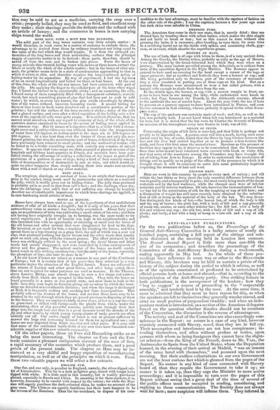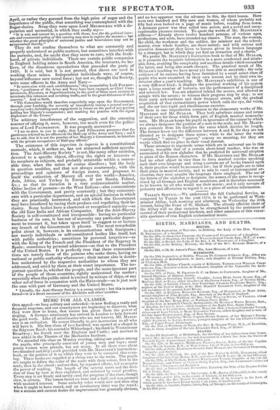ANTI-SLAVERY PUBLICATIONS.
Or the two publications before us, the Proceedings of the General Anti-Slavery Convention is a bulky octavo of nearly six _hundred pages, containing a full report of the sittings and sub- jects discussed at the meeting held in London last summer. The Second Annual Report is little more than one-fifth the size of its companion ; and describes the proceedings of the Committee of the Anti-Slavery Society during a twelvemonth, ending apparently in May last. As the whole of these pro- ceedings have reference in some way or other to the Slave-trade and Slavery, this brochure may be held to contain a précis of the history of the subject during the period to which it relates, as well as of the opinions entertained or professed to be entertained by official persons both at home and abroad,—that is, according to the interpretation of the Anti-Slavery party. One striking feature in both publications is the management of the leaders ; how they "beg to suggest" a course of proceeding to the "respectable assembly," and tenderly lead it by the nose. At the same time, it must be admitted that they seem to have reason for this, as when the speakers are left to themselves they generally wander abroad, and utter no small portion of purposeless twaddle ; and when an inde- pendent motion is introduced, as a section of the American delegates forced on the question whether females should not be members of the Convention, the discussion is the reverse of advantageous.
The activity and zeal of the Committee are also exceedingly con- spicuous in the Report : no sooner is a case of any kind, however remotely connected with Slavery, nosed, than they are in full cry. Their assumption and interference are not less conspicuous ; in- truding themselves, and often without preface or notice, upon persons with whom as being foreigners they cannot have the slight- est relation—from the King of the French, down to Mr. Van, the Ambassador to Spain from the United States, whom the Deputation learned, in the evening of their arrival at Madrid, "was an inmate of the same hotel with themselves," and pounced upon the next morning. But their endless exhortations to our own Government are not the least curious fact which is gleaned from the pages of the Report. No sooner is any kind of case connected with Slavery heard of, than they require the Government to take it up ; no sooner is it taken up, than they urge the Minister to more active proceedings ; and it is impossible to turn over the pages of this Report without seeing that a great deal of the time of several of the public offices must be occupied in reading, considering, and replying to these communications. The Society does not always wait for facts ; mere suspicion will inflame them. They inferred it April, or rather they guessed from the high price of sugar and the impatience of the public, that something was contemplated with the Sugar-duties. Swap they were upon Lord MELBOURNE with a de- putation and mernonal, in which they coolly say— "It is not, and cannot be, a question with them, how far the political inter- ests and commercial policy of this country may seem to require the measure ; but whether the great principles of universal justice and benevolence may not be compromised thereby." They do not confine themselves to what are commonly and properly understood as public matters, but sometimes interfere with the pursuits, and, for aught that they seem to care, with the liveli- hood, of private individuals. There are certain public companies in England holding mines in South America, the remnants, we be- lieve, of the disastrous speculations that preceded the panic of 1825. It is said, but it is not proved, that slaves are used in working these mines. Independent individuals were, of course, beyond influence save moral force ; but not so, thought the Society, were some officers in the Army and Navy— "In connexion with such establishments," they memorialize Loa PALMER- STON, "gentlemen of the Army and Navy have been engaged, as Chief Com- missioners, Directors, or Superintendents, to the grief of those most anxious to terminate this inhuman and revolting traffic, and to the great dishonour of their country." And so forth.
"The Committee would therefore respectfully urge upon the Government, through your Lordship, the necessity of immediately issuing a general and pe- remptory order, forbidding such engagement in future on the part of any persons holding her Majesty's commission; and marking the practice with the signal displeasure of the Crown."
The arbitrary interference of the suggestion' and the assuming manner of offering it, were, however, too much even for the polite- ness of Lord PALiazits.rox. It was properly answered- " I am to state to you in reply, that Lord Palmerston presumes that the gentlemen referred to, are officers on the Half-pay of the Army and Navy ; and I am to add, that it is not the practice of her Majesty's Government, to interfere with the private occupations of Half-pay officers."
The existence of this imperium in imperio is a constitutional anomaly, which, it strikes us, has not attracted sufficient specula- tion. The Anti-Slavery Society * is not, like many other societies, devoted to a specific object, affecting the rights or interests of its members as subjects, and probably attainable within a reason- able time, when the union of course dissolves ; but the body in question meddles, and that not always courteously, with the proceedings and opinions of foreign states, and proposes to itself the extinction of Slavery all over the world—America, Asia, Africa, and Turkey in Europe, if not Russia, Poland,
so that its duration is a very undeterminable matter. Other bodies of persons—as the West Indians—also communicate with the Government, and pretty constantly ; but they communi- cate with a particular department, and on special business in which they are practically interested, and with which the Government may have interfered by taxing their produce and regulating their in- dustry. Some bodies have a chartered or recognized capacity—as the old East India and African Companies. But the Anti-Slavery Society is self-constituted and irresponsible : having no particular business of its own, it has not of necessity any particular depart- ment to transact it, but takes upon itself to suggest to or lecture any branch of the Government it pleases. The most remarkable point about it, however, is its communications with foreigners ; not merely individuals or self-constituted bodies like itself, but with public authorities ; sometimes by personal interviews—as with the King of the French and the President of the Regency in Spain ; sometimes by personal addresses—as that to the President of the United States. It is perfectly true that these communica- tions are merely those of the persons who make them, having no national or public authority whatsoever ; their nature also is doubt- less understood by the respective authorities to whom they are addressed, and rated by them at their exact importance. The im- portant question is, whether the people, and the more ignorant part of the people of those countries, rightly understand the matter ; especially when the public mind is excited by seizure of ships, or any other act of force in connexion with the Slave-trade—as is just now The case with part of Germany and the United States.
* Literally, the Anti-Slavery Society is a young society : but this is merely formal—it is a direct successor of the Abolition and other societies.



























 Previous page
Previous page